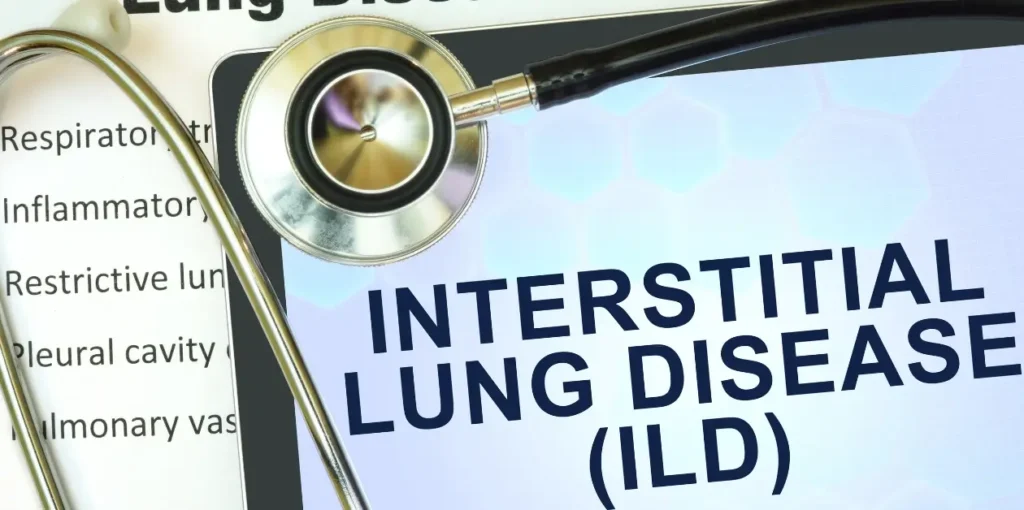Understanding Interstitial Lung Disease (ILD)

Interstitial Lung Disease (ILD) is a term that encompasses a large group of lung disorders, all of which cause progressive scarring of lung tissue. This scarring can lead to significant breathing problems and reduced oxygen levels in the blood. Let’s delve into the details of ILD, its causes, symptoms, diagnosis, and treatment options.
What is Interstitial Lung Disease?
Interstitial Lung Disease refers to a collection of over 200 different lung disorders that affect the interstitium, the tissue and space around the air sacs of the lungs. This scarring, or fibrosis, makes the lung tissue stiff, which in turn makes it difficult for the lungs to work properly. Over time, this can lead to serious health issues, including respiratory failure.
Causes of Interstitial Lung Disease (ILD)
The causes of ILD can be broadly categorized into known and unknown origins:
- Known Causes:
- Occupational and Environmental Exposures: Long-term exposure to hazardous materials such as asbestos, silica dust, and coal dust.
- Medications: Certain drugs, including chemotherapy agents, antibiotics, and heart medications, can cause lung damage.
- Radiation Therapy: Used in cancer treatment, radiation can lead to lung scarring.
- Autoimmune Diseases: Conditions like rheumatoid arthritis, lupus, and scleroderma can cause ILD.
- Infections: Chronic infections such as hepatitis C and HIV.
- Unknown Causes:
- Idiopathic Pulmonary Fibrosis (IPF): The most common form of ILD with no known cause.
Symptoms of Interstitial Lung Disease
The symptoms of ILD can vary but generally include:
- Shortness of breath, especially during or after physical activity
- A dry, persistent cough
- Fatigue and weakness
- Unintended weight loss
- Discomfort or pain in the chest
As the disease progresses, symptoms can worsen, leading to severe respiratory issues.
Diagnosis of ILD
Diagnosing ILD involves a combination of medical history, physical examinations, and various tests:
- Imaging Tests: High-resolution CT scans and X-rays to detect lung abnormalities.
- Pulmonary Function Tests: To measure lung capacity and the efficiency of gas exchange.
- Blood Tests: To identify underlying conditions or infections.
- Bronchoscopy: A procedure to collect lung tissue samples.
- Lung Biopsy: In some cases, a surgical biopsy may be necessary to confirm the diagnosis.
Treatment Options
While there is no cure for ILD, treatments aim to manage symptoms and slow disease progression:
- Medications: Anti-fibrotic drugs like pirfenidone and nintedanib can help reduce lung scarring. Corticosteroids and immunosuppressants may also be prescribed.
- Oxygen Therapy: To maintain adequate oxygen levels in the blood.
- Pulmonary Rehabilitation: Exercise and education programs to improve lung function and overall health.
- Lung Transplant: In severe cases, a lung transplant may be considered.
Living with ILD
Living with ILD requires ongoing medical care and lifestyle adjustments:
- Regular Monitoring: Frequent check-ups with a pulmonologist.
- Healthy Lifestyle: Eating a balanced diet, staying active, and avoiding smoking.
- Vaccinations: Staying up-to-date with flu and pneumonia vaccines to prevent respiratory infections.
Conclusion
Interstitial Lung Disease is a complex and challenging condition, but with proper management and care, individuals can maintain a good quality of life. Early diagnosis and treatment are crucial in slowing the progression of the disease and managing symptoms effectively.
For more detailed information and support, consult with healthcare professionals and consider joining support groups for individuals with ILD.
About Author
Interventional Pulmonologist
M.B.B.S, D.T.C.D (Gold Medalist), DNB (Pulmonary Medicine) , Fellowship in Interventional Pulmonology
Dr. M.V.S. Keerthi is a leading pulmonologist renowned for her exceptional skills in pulmonary medicine and her empathetic approach to patient care. Dr. Keerthi is passionate about innovation and lifelong learning, and she is committed to providing her patients with individualized, advanced care. She is a well-respected and trusted individual in respiratory medicine because of her unwavering dedication to quality and collaborative spirit. The finest results for her patients are guaranteed by Dr. Keerthi’s skill and compassion, whether she is managing complicated pulmonary problems or offering everyday care.

